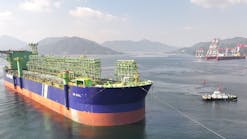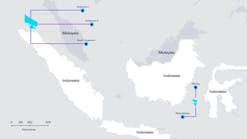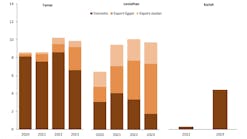Dev George
Houston
China 3, Russia 0
Walk the streets of Moscow and Beijing, of St. Petersburg and Shanghai, and what do you see: in Russia, crushing poverty and hopelessness, in China, burgeoning prosperity and optimism. Both countries have effectively broken the bonds of communism that suppressed democracy, directed their economies, and insulated their societies from the rest of the world. Both are now open, inviting investment and seeking greater participation in the international community. And both have enormous hydrocarbon reserves that are needed for internal development and to earn hard currency through export.
But there, the similarities cease. The exhilaration in Russia following the collapse of the Soviet Union has faded with the grim realization that Yeltsin himself is incapable of effective leadership and that his government can do little as long as the present political gridlock prevails. Even the tragic war waged in Chechnya can't divert attention from the ineptitude of the central government.
Much needed laws simply don't get passed, the economy languishes, decrees die, and long negotiated contracts lie fallow without parliamentary approval, all simply because of the political impasse between the Yeltsin administration and the parliament. Worse still, that power vacuum has been filled by a Russian mafia, and anarchy predominates.
Petroleum exploration and development contracts with foreign companies have, for the most part, yet to be executed. Or, they may have been abrogated and given over to domestic organizations that have neither the technology nor the know-how to do the job.
Certainly some service agreements have been mildly successful, some equipment supply has proven fortuitous. But, for the most part, the role of foreign companies in the Russian oil and gas industry has expanded little since the demise of the Soviet Union.
On the other hand, the government of Deng Xiaoping has taken a gradual approach to democratic reform and the transformation of the Chinese to a market-based economy. In doing so, it has maintained strong central leadership and avoided the errors and pitfalls that so devastated the Russian social, political, and economic sectors when virtually all former institutions were abolished. Deng's economic reforms have effectively eliminated the poverty that once characterized China, and they have maintained social cohesiveness while opening the country to foreign enterprise, to free market competition, to individual and corporate joint ventures with other Chinese and foreign investors.
There is a genuine sense of growth and well being in China. The country is enjoying an enormous economic boom, focused primarily in the south-southeast, but felt nationwide. And a major player in that boom is the presence of foreign oil corporations among the myriad international companies that have established operations in the country.
They are there because China is simply a better, more reliable, less risky market. The infrastructure is in place for investment - a workable legal structure, reasonable taxes, insurance, a stable political situation, and a rapidly expanding economy geared to both domestic consumption and foreign exports. Unfortunately, the same cannot be said for Russia, where investment in its petroleum sector continues to become less and less attractive.
Militant Islam threatening reign of Mideast monarchs
Kings Fahd of Saudi Arabia and Hussein of Jordan, Sultan Qabus of Oman, and the Emirs of Kuwait, Qatar, Bahrain, and the United Arab Emirates are currently being challenged by the indigenous Islamic fundamentalist movements of each of their countries. Among them - Hussein excepted - they control some two-thirds of the earth's known oil reserves, and the revenues from the sale of that oil to the rest of the world fatten their treasuries and the bank accounts of their families and friends, but have done little to alleviate the poverty of their respective populations.
Disenchanted with their lack of participation in government, by their poverty and unemployment, and left without surrogate warriors now that the Palestinians are coming to terms with Israel, the Arab masses ruled by these monarchies are now looking to traditional Islam as a hoped-for champion to redress their grievances. Thus, where these conditions are greatest, militant Islamic fundamentalism has arisen as a threat to the status quo - in particular to the monarchies that fritter away their patrimony or spend it on self-perpetuation and protection from the populace and nearby threats, both real and imagined.
Oil and gas from these monarchies isn't really threatened, however, as many pundits have asserted. Even at its most anti-Western, anti-US stage, Iran under Khomeini continued to produce and export its oil. So, too, will it be if these kings go the way of the Shah. Political instability in the Persian/Arabian Gulf precipitated by militant Islam is a virtual certainty. Since most of these monarchs neither have the wherewithal to remedy the lives of their subjects nor the inclination to do so, they will indeed fall, but Western and Japanese access to the region's hydrocarbons will likely continue, depending on whether individual countries interfere in the civil wars that depose them.
World offshore production growing
Worldwide offshore oil production growth will be almost double that of overall production, including onshore, if the anticipated 3.5 increase in 1995 is realized - despite being less than last year's 5.9% growth. So says UK's Mackay Consultants.
"We expect the oil industry to maintain a high growth rate in offshore production this year and the next few years," Mackay said.
Offshore's 1994 rate of oil production was over five times that of the industry as a whole. The year's largest gain was by Northwest Europe, with a 19.5% increase over 1993. In gas, Northwest Europe is expected to lead with a production increase of 7.7, followed by the Far East at 5.3%, and Gulf of Mexico at 2.4%.
BRIEFS:
MideastEgypt's Gebel El Zeit in the southern Gulf of Suez, has witnessed a successful wildcat by Marathon, which holds 100% interest in the concession. The Ras El Ush-2 well was directionally drilled to evaluate the reservoir and encountered hydrocarbons. It tested 3,850 b/d oil.
New Caspian concessions have been granted by Azerbaijan's state oil company Socar to the Russian independent operator, Lukoil. The transaction involves two fields to be developed, the Kyapaz and Karabakh Fields. Agip is negotiating for an interest in the project.
Conoco's $1 billion Iranian deal to develop the Sirri A and E Fields in the Persian Gulf through a European subsidiary has been killed by the US government, which has south to maintain political and economic pressure on Iran since its 1979 revolution. A ban on US companies doing business with Iran has been in effect since then. Conoco competed with European majors for the project, in which it would have acted as contractor for NIOC.
Africa
West African offshore drilling for exploration and appraisal is expected to almost double that of last year, according to analysts Wood Mackenzie. Between 40 and 46 wells are expected this year, as opposed to 22 in 1994 and 25 in 1993. Reasons given: the ceasefire in the Angolan civil war, a jump in Elf and Oxy drilling in Gabon, and big increases in wells scheduled for Congo, Cameroon, and Namibia.
The Cote d'Ivoire's Lion Field is proving to be larger than expected. Union Meridian's first of four development wells, A-2, showed an additional 3,000 ft extension west of the discovery well, flowing in tests at 5,460 b/d oil and 4 MMcf/d gas. The discovery well tested 23,696 b/d oil and condensate and 65 MMcf/d gas. Nearby Panthere Field's discovery tested 732 b/d condensate and 30 MMcf/d gas. Production is set to begin in October.
South African seismic survey is currently being conducted by PGS for Soekor, the South African state oil company. The exclusive 3D survey, using the MV Nordic Explorer, is to cover some 600 sq km of the South African shelf.
Europe
Italy protesting Malta offering licenses for production on its Mediterranean shelf in region claimed by Italy. The Italian government maintains that some of the areas on offer lie within Italian jurisdiction or are closely associated with Italian interests. Malta, however, maintains its Area 5 offering is entirely legal, but says blocks let (Blocks 1 and 3) may be subject to alteration under any future boundary agreement with neighbors.
Ireland has awarded blocks in its frontier Porcupine Basin. In its second frontier licensing round, some 32 blocks were granted. The southern sector of the Basin drops to a water depth of over 2,000 meters. New terms, ranked best in the world, had been offered to encourage the bids, and there were few restrictions imposed. Term is 15 years.
North Sea union formed by offshore oil workers in the UK and Norway. The new joint UK-Norwegian union, formed by the Offshore Industry Liaison Committee and Norway's OFS union will have more than 10,000 members.
Russia's Prirazlomnoye Field is under feasibility study by Gazprom subsidiary Rosshelf, BHP, and Brown & Root. Located north of the Arctic Circle in the Pechora Sea some 55 km offshore in 60 ft of water, the field is subject to frozen seas seven months of the year.
Asia
- New Philippine licensing area off southwest Palawan Island, Block SPR-94.
- Oceanic Exploration'suntouched concession from Taiwan fronting on China's Wenzhou Prospect.
Philippines to offer Southwest Palawan acreage in November. A 12,000 sq km offshore tract, SPR94, is to be offered for exploration and development by the Philippine Department of Energy this fall between the prospective northwest Palawan and Sabah basins. PGS Nopec is handling the licensing of reprocessed data for interested operators.
Taiwan's 3.7 million acre tract immediately east of China's Wenzhou (Southern) concession area in the East China Sea, granted to Oceanic Exploration in 1970 and under force majeure since 1977, may be back in operation soon, despite border disputes with China and Japan. Old seismic is being reprocessed and a new drill site selected in anticipation of new activity precipitated by the flurry of exploratory drilling and seismic in the adjacent Chinese aquatory.
An Indonesian well off Java drilled by operator Arco and partner Maxus Energy has discovered a new field. The LES-1 well, tested in five zones some 62 MMcf/d gas and 1,219 b/d condensate. The Northwest Java concession, on which the well was drilled, currently produces more than 200 MMcf/d gas, 110,000 b/d oil, and about 10,000 b/d natural gas liquids.
Another ZOC discovery has been announced. The Bayu-1 well in Block ZOCA 91-13, drilled by Phillips, in the Timor Gap Zone of Cooperation A, tested 90 MMcf/d gas and 5,250 b/d condensate from four zones.
Timor Sea seismic data in the important Bayu, Elang, Laminaria, and Kakatua discovery area has been acquired in a new non-exclusive survey by Geco-Prakla. Some 2,100 km of a 3,200 km survey of Australian and Indonesian waters has been completed over vacant acreage subject to licensing this month.
Americas
- New licensing blocks in Alaska'sCook Inlet are located on the Kenai Peninsula near Kasilof.
Alaska's upper Cook Inlet blocks have been proposed for lease sale. The 16 blocks, composing a tract of almost 61,000 acres, lie off the Kenai Peninsula at Kasilof. These same blocks were offered in a previous sale and received no bids. They lie northeast of the most productive region of the Inlet.
Mexico discoveries off Tabasco may prove to be an entirely new petroleum province situated between the onshore Chiapas-Tabasco area and the Campeche Sound. The two successful wells, Bolonktecko and Hayabil, were drilled in shallow water off the Tabasco coast near the town of Frontera. They produced crude oil between 39 and 46 gravity, but have yet to be tested.
Trinidad seismic survey underway. Amoco Trinidad has commissioned PGS to acquire and process a 45,000 CMP km high density 3D survey of offshore Southeastern Trinidad. The contractor will employ a five-streamer configuration for the acquisition.
Petrobras calls for three more semis with capability of drilling to a final depth of 5,000 meters at water depths ranging from 350 to 860 meters. The semis are to be capable of completion and workover services as well. The rigs are to work throughout the Brazilian coastline.
Venezuela to offer Paria Gulf exploration and development for private international bidding this year. Both highly prospective, the East Block and West Block of the Gulf of Paria, between Venezuela and Trinidad, are known to hold significant deposits of both oil and gas. International companies will develop discoveries in JV with PDVSA.
Copyright 1995 Offshore. All Rights Reserved.




